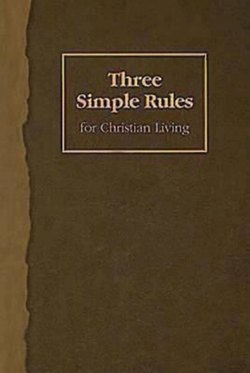Читать книгу Three Simple Rules for Christian Living - Rueben P. Job - Страница 4
На сайте Литреса книга снята с продажи.
Introduction
ОглавлениеSince it was published in 2007, Bishop Rueben Job's Three Simple Rules has been widely read and studied. Extended reflection on the three rules can lead us to a more faithful way of living as disciples of Christ. This study, Three Simple Rules for Christian Living, is an effort to provide such extended reflection.
John Wesley believed that following Christ in a way that renews both individuals and communities required disciplined practices. These were outlined in the "General Rules" that Wesley wrote for the class meetings that were the core communities of the early Methodist movement. These disciplined practices gave power and strength to people of the early Methodist movement to live as faithful disciples of Jesus Christ.
Bishop Job, in lifting up these "three simple rules," helps us return to those early Wesleyan roots and find resources that can transform us and the world in which we live. Job calls us to consider these three rules as an alternative to the often frenzied, divisive, and destructive lifestyle our culture offers us. This alternative way of life is accessible to everyone regardless of age, financial standing, education, health, relative power, or theological understandings.
Our culture has forgotten the importance of community and stressed ndividualism too much. Often we in the church have not taken the gospel seriously but have focused on trivialities and divisions that distract us from loving God and neighbor. We drain our witness to God's redemptive power as we find ever new ways to harm each other. Bishop Job calls us to remember who we are: people who know about practices of forgiveness, reconciliation, transformation, and new life.
Job calls these three rules "a way of holy living that is constantly reforming and renewing the individual and the community" (Three Simple Rules; p. 17). They are Christian practices that also heal the wounds of the world and work for justice. Loving God results in loving the world. Job writes, "Spiritual disciplines not only include practices that bind us to God every day; but they also include actions that heal the pain, injustice, and inequality of our world. It is impossible to stay in love with God and not desire to see God's goodness and grace shared with the entire world" (Three Simple Rules; p. 58).
As you read and reflect on these rules, you'll notice that they are interrelated. The first two rules, "do no harm" and "do good," are ways of keeping the commandments to love God and neighbor. When we explore rule three, "stay in love with God," we'll see that the particular disciplines that keep us in close relationship to God are practices through which God empowers us to love God and neighbor.
In these pages we will be reflecting on what these rules meant to Wesley and the early Methodist movement and what they can mean to us today. Then we will explore ways we can practice them in our own lives. I invite you to take this journey of exploration and reflection so as to discover ever deepening ways you can be formed and renewed in the Christian life.
—Jeanne Torrence Finley
Jeanne Torrence Finley is a clergy member of the Virginia Conference of the United Methodist Church, co-chair of the Virginia Conference Board of Church and Society, and director of Collegial Communications. She has worked as a campus minister, pastor, college English teacher, workshop leader, and communications consultant. Finley writes regularly for FaithLink. Her work has appeared in the Journal of Presbyterian History, Worship, The Mennonite, Christian Science Monitor, the Virginia Advocate, and Christian Social Action.
